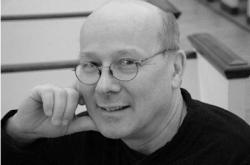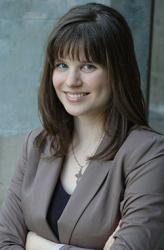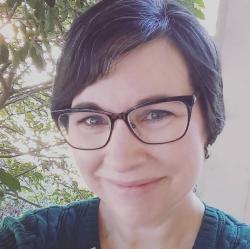Planning worship?
Check out our sister site, ZeteoSearch.org,
for 20+ additional resources related to your search.
- |
User Links
Person Results
Zacharius Ursinus
1534 - 1583 Scripture: Romans 14:7-8 Author of "My Only Comfort" in Lift Up Your Hearts German theologian
Zacharius Ursinus
Caspar Olevianus
1536 - 1587 Scripture: Romans 14:7-8 Author of "My Only Comfort" in Lift Up Your Hearts
Caspar Olevianus
Marlene Veenstra
Scripture: Romans 14:7-8 Versifier of "My Only Comfort" in Lift Up Your Hearts
Marlene Veenstra
Andrew Donaldson

b. 1951 Scripture: Romans 14:17 Author of "We Will Go Out with Joy" in Glory to God Andrew Donaldson, a composer and church musician, grew up in northern Ontario, Canada. He attended Glendon College, York University in Toronto, receiving a Bachelor of Arts degree in 1974. He went on to study classical guitar performance at the Royal Conservatory of Music in Toronto, receiving its ARCT (Associate of Royal Conservatory Teachers) degree in 1979. Since then he has worked as a composer and performer in many contexts, in both French and English.
Andrew co-edited the Book of Praise (1997), Presbyterian Church in Canada, with Donald Anderson. Their company, Binary Editions, continues to administer copyright for the PCC.
In 2007 he was made a Doctor of Divinity, honoris causa, by Knox College of the University of Toronto, for his body of work in congregational song in the Presbyterian Church in Canada.
In 2011 Andrew and his wife, Wendy, moved to Geneva, Switzerland where Andrew works as a worship consultant to the World Council of Churches.
--Submitted by Andrew and Wendy Donaldson, 13 August 2013
Andrew Donaldson
Hilary Seraph Donaldson

Scripture: Romans 14:17 Author of "We Will Go Out with Joy" in Glory to God Hilary Seraph Donaldson is a church musician and writer from Toronto, Canada. She is an MA student in Musicology at the University of Toronto, and a graduate of the Master of Sacred Music programme at Perkins School of Theology (Dallas, TX), with a concentration in choral conducting.
As an academic writer, her research interests are focussed on the sacred anthems of Benjamin Britten. Her approach to music ministry is informed by a background in theatre and choral music, and by her love of syncopation, harmony, and the drama of worship. Hilary has worked with adult, children's and youth choirs, and has served congregations both locally and internationally. She contributed a recurring Hymn Study column to The Chorister (Chorister's Guild) from 2010 to 2012, and is published in The Hymn and Choral Journal.
Hilary writes a blog on worship and congregational song called, Transforming Every Guest.
http://sicm.ca/new/
Hilary Seraph Donaldson
Johann Mentzer
1658 - 1734 Person Name: Johann Mentzer (1658-1734) Scripture: Romans 14:11 Author of "O That a Thousand Tongues I'd Treasure" in The Christian Hymnary. Bks. 1-4 Mentzer, Johann, was born July 27, 1658, at Jahmen, near Rothenburg, in Silesia, and became a student of theology at Wittenberg, In 1691 he was appointed pastor at Merzdorf; in 1693 at Hauswalde, near Bischofswerda; and in 1696 at Kemnitz, near Bernstadt, Saxony. He died at Kemnitz, Feb. 24, 1734 (G. F. Otto's Lexicon . . . Oberlausizischer Schriftsteller, ii., 581; ms. from Pastor Richter of Kemnitz, &c).
He was a great friend of J. C. Schwedler, of Henrietta Catherine von Gersdorf, and of N. L. von Zinzendorf, all hymnwriters, and all his near neighbours. He was himself greatly tried in the furnace of affliction. He wrote a large number of hymns, over 30 of which appeared in the various hymnbooks of his time. Many of them, especially those of Praise and Thanksgiving, and those of Cross and Consolation, are of high merit, though sometimes exaggerated and not very refined in their imagery, and are full of ardent love to Christ, Scriptural, poetical, and also popular in style.
The only one in English common use is:—
0 dass ich tausend Zungen hatte. Praise and Thanksgiving. His best hymn. First published as No. 496, in Freylinghausen's Gesang-Buch, 1704, in 15 st. of 6 1., and repeated in many later collections as the Unverfälschter Liedersegen, 1851, No. 719.
Lauxmann, in Koch viii. 350, says this hymn was written in 1704 after his house was burned down. In reply to enquiries addressed to Kemnitz, pastor Richter informs me that the parsonage house there was built in the years 1696 and 1697, and has never been burned down. In 1697 a farmhouse near was destroyed by lightning, and possibly Mentzer may have been living there at the time; or at any rate this may have suggested the hymn and the story. Lauxmann speaks of the hymn as having been a great favourite of Caroline Perthes of Hamburg, and of J. C. Schlipalius of Dresden, and relates various incidents regarding its blessed and comforting effects.
The translations in common use are:—
1. Oh that I had a thousand voices! A mouth. A full translation by Dr. H. Mills, in his Horae Germanica, 1845 (1856, p. 189); repeated, abridged, in the American Lutheran General Synod's Collection, 1850-52, the Ohio Lutheran Hymnal, 1880, &c.
2. Oh be unceasing praise ascending. A good translation of st. i., vii., viii., by A. T. Russell, as No. 203, in his Psalms & Hymns, 1851.
3. Oh would I had a thousand tongues. A good translation, omitting stanzas ix., x., xiii., by Miss Winkworth, in her Lyra Germanica, 1st Ser., 1855, p. 170; and repeated, abridged, in the Methodist New Congregational Hymn Book, 1863.
4. 0 would, my God, that I could praise Thee. A good translation, in the original metre, by Miss Winkworth, in her Chorale Book for England, 1863, No. 5, being of stanzas i., iii.—v, xiv., xv. This was repeated in the Evangelical Hymnal, N. Y., 1830. A filtered form, beginning with st. iii., "0 all ye powers that God implanted” is in Dr. Knight's Collection, Dundee, 1871 and 1874.
5. I praise Thee, 0 my God and Father. By Miss Winkworth, in her Chorale Book for England, 1863, No. 6. This is of st. vi.-viii., xi., xii., and fol¬lows the text of Bunsen's Versuch, 1833, No. 846, this stanza beginning there, "Lob sei dir, treuer Gott und Vater." Her translation is repeated in Dr. Thomas's Augustine Hymn Book, 1866.
Other translations are:—
(1) "0 that a thousand tongues were granted," by N. L. Frothingham, 1810, p. 155. (2) "0 that a thousand tongues were mine, And each," by Dr. Alexander Mair in the Family Treasury, 1872, p. 462.
Other hymns by Mentzer, translated into English but not in common use are:—
ii. Du gehest in den Garten beten. Passiontide. First published in the Löbau Gesang-Buch, 1725, as No. 370, in 12 stanzas of 6 lines, marked as by Mentzer and entitled "The true school of prayer of Jesus, praying on the Mount of Olives, Matt. xxvi. 36-46." In the Berlin Geistliche Lieder, ed. 1863, No. 223, beginning "Du gehst zum Garten urn zu beten," and wrongly ascribed to B. Schmolck. Translated as "Into the garden shade to pray," by J. Kelly, in the Family Treasury, 1868, p. 691.
iii. Wer das Kleinod will erlangen. Christian Warfare. A call to spiritual energy, founded on 1 Cor. ix. 24, 25. Included as No. 783 in the Neuvermehrtes Geistreiches Gesang-Buch Berlin, 1711, in 6 stanzas of 8 lines; and previously in Schlechtiger's Gesang-Buch, Berlin, 1704. In the Berlin Geistliche Lieder, ed. 1863, No. 679. Translated as "Who would make the prize his own." By Miss Winkworth, 1858, p. 167. [Rev. James Mearns, M.A.]
-- John Julian, Dictionary of Hymnology (1907)
Johann Mentzer
E. Artis W. Weber
Scripture: Romans 14 Author of "In Essentials Let Us Be United" in Moravian Book of Worship
E. Artis W. Weber
Thomas O. Chisholm

1866 - 1960 Person Name: T. O. Chisholm Scripture: Romans 14:12 Author of "What Account Will You Give?" in Uplifting Songs Thomas O. Chisholm was born in Franklin, Kentucky in 1866. His boyhood was spent on a farm and in teaching district schools. He spent five years as editor of the local paper at Franklin. He was converted to Christianity at the age of 26 and soon after was business manager and office editor of the "Pentecostal Herald" of Louisville, Ky. In 1903 he entered the ministry of the M. E. Church South. His aim in writing was to incorporate as much as Scripture as possible and to avoid flippant or sentimental themes.
Dianne Shapiro, from "The Singers and Their Songs: sketches of living gospel hymn writers" by Charles Hutchinson Gabriel (Chicago: The Rodeheaver Company, 1916)
==============================
Signed letter from Chisholm dated 9 August 1953 located in the DNAH Archives.
Thomas O. Chisholm
Lisa Ann Moss Degrenia

Scripture: Romans 14:19 Author of "Bless Christ through Whom All Things Are Made" in Worship and Song Lisa Ann Moss Degrenia was born in Tampa, Florida, one of a long line of native Floridians and teachers. She didn’t grow up attending church. As a teen, she started attending a local Baptist church with her boyfriend. At age 16 she accepted Jesus Christ as her Lord and Savior and was baptized. A few months later “the guy left, but God stayed.”
Lisa first found God through music and thought she would be a high school choral director. God had other plans. In 2000, Lisa received a Master of Divinity degree from Duke Divinity School and was later ordained a United Methodist minister in 2003. She has served congregations in Largo, St. Petersburg, DeBary and Sarasota, Florida.
In addition to serving as a pastor, Lisa enjoys leading retreats, photography, theatre, and writing. She is indebted to the many wonderful mentors and teachers in her life, including her mother who first gave her a love for words.
You are welcome and encouraged to follow her writing at www.revlisad.com
Lisa Ann Moss Degrenia
Lisa Ann Moss Degrenia
Laurie Zelman
Scripture: Romans 14:19 Author of "Amazing Abundance" in Worship and Song
Laurie Zelman


 My Starred Hymns
My Starred Hymns


